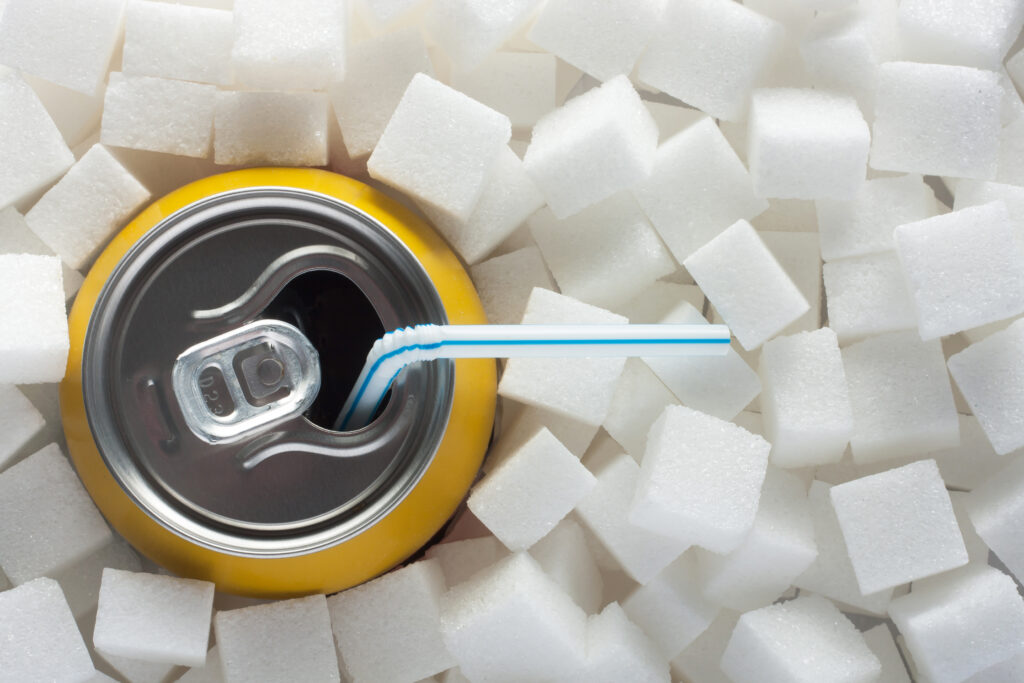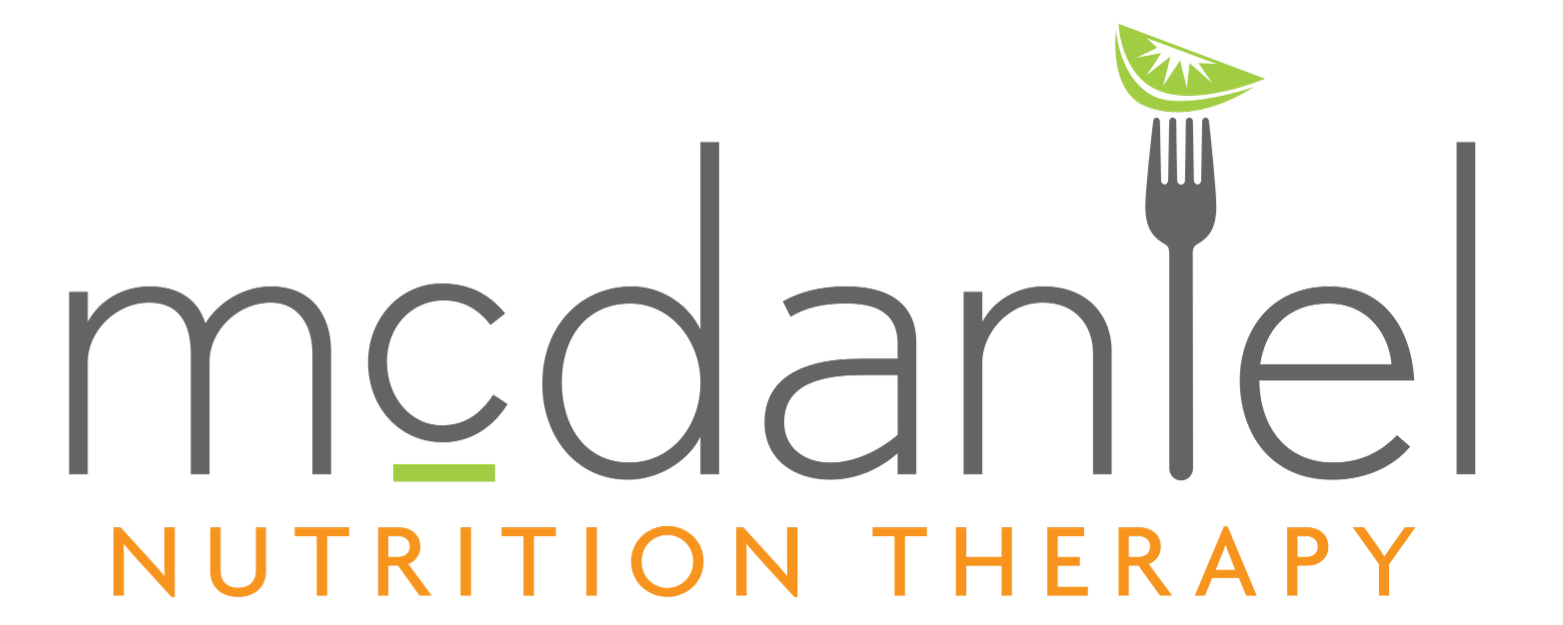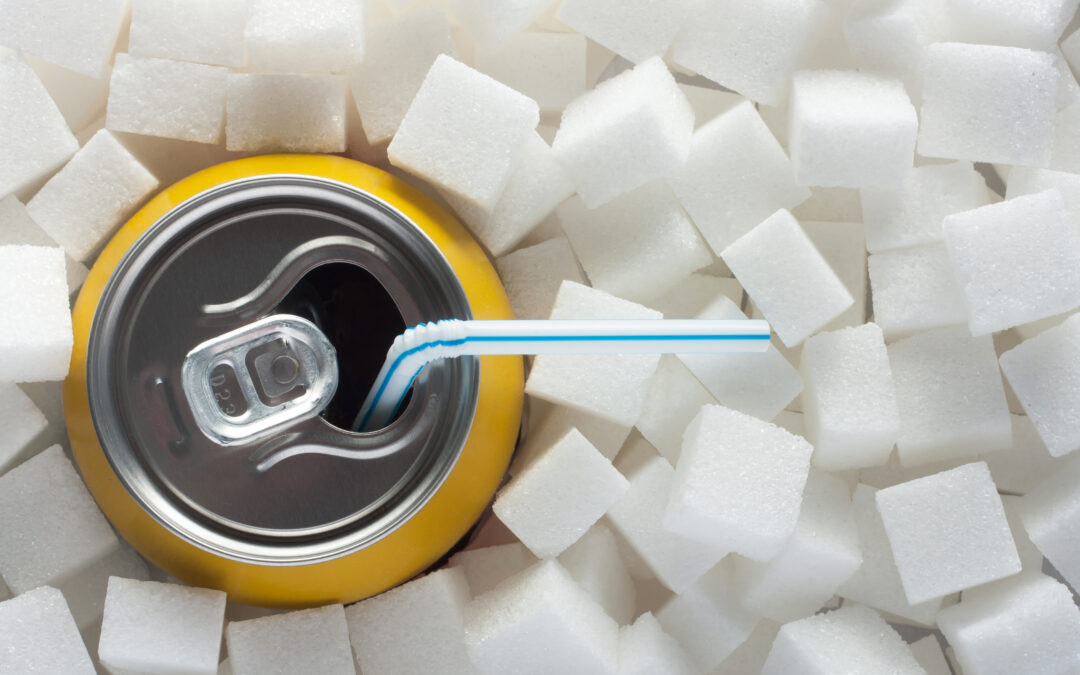Have you ever thought you’ve got a sugar addiction?
You’re staring at an empty sleeve of Girl Scout cookies. Kind of…in shock. You only wanted a couple, but for whatever reason, it was hard to stop. This might leave you wondering; am I addicted to sugar? It’s a common experience for people to feel out of control around high calorie, high sugar, or high fat foods. As dietitians, we aim to help our clients feel empowered about their relationship with food.

What is sugar?
The American Heart Association divides sugar into two categories, naturally occurring sugars and added sugars. Naturally occurring sugars are in foods like fruit or milk. In addition to the naturally occurring sugars, these foods contain fiber, protein, fat, and other nutrients that have positive health benefits. Added sugars are exactly what they sound like, sugars artificially added to foods. Food manufacturers add sugar to products to improve taste and increase shelf life. These sugars are in a variety of processed foods, including cookies, pastries, sweetened beverages, etc. Added sugars don’t contain the same beneficial nutrients found in naturally occurring sugars.
How much added sugar is too much?
It is hard to say exactly how much sugar is too much, since everyone has different calorie and nutrient needs. Even though there is no Recommended Daily Allowance (RDA) for sugar, the American Heart Association says that men should have no more than 36 grams (9 tsp) of added sugar per day and women no more than 24 grams (6 tsp). To put this into perspective, there are 39 grams of added sugar in one can of Coke!
The average American eats around 77 grams of sugar per day – that’s about 19 tsp of sugar! It’s pretty obvious to most people that sweetened beverages, cookies, pastries, and ice cream have a lot of added sugar. But there is a lot of added sugar lurking in unexpected places and it’s those foods that contribute most to our high sugar intake. Foods like salad dressing, soy milk, yogurt, and bread can have added sugar content that rivals cookies and candy. It’s important to look at the amount of sugar in these foods to make sure you aren’t eating too much hidden sugar.
While it’s definitely tasty, eating too much added sugar has been connected to higher blood pressure, inflammation, weight gain, and diabetes.
Can you have a sugar addiction?
Well, yes and no! There’s a disagreement among health professionals over whether or not sugar addiction is real. This concept was first theorized in 2013 when a research study found a similarity between how the brain responds to sugar and drugs. More research is needed to really see if this is the case, but as of right now, it doesn’t appear that the body responds to sugar the way that it does to drugs.
While it’s understandable to feel out of control around sugar, it just doesn’t have what it takes to be considered addictive by the standards of addiction researchers or the Diagnostic and Statistical Manual of Mental Disorders (DSM-5).
Labeling ourselves with some sugar “addiction” can be disempowering and sabotage our relationship with food. Unlike an addiction to drugs, you can’t just stop eating food. Also, foods, including sweets can be culturally significant and hold a social connection. Some sweets are used for celebrations like cake on your birthday or special desserts on holidays. Trying to avoid sugar completely might leave you feeling socially isolated. So, it is important to improve your relationship with food, and find a balance.
What can we do to support ourselves if we do feel out of control around sugar?
- Make sure you’re eating enough. AND that you’re eating foods that you like and find satisfying. Becoming overly hungry can increase cravings for high calorie, high sugar, or high fat foods. By choosing balanced meals and snacks that meet both physical and emotional needs, you are less likely to experience these cravings.
- Consider rewriting food coping choices. There is nothing wrong with using food as comfort, but when that becomes our “go-to” for stress reduction or emotional balance – that is a cause to reevaluate how you’re using food to deal with life. Come up with a game plan – the next time you feel a craving – connect with it. Pay attention, what does that feel like in your body or head? Try noticing how you feel, without judgment. Try something else to give yourself the chance to see if the craving will pass. Have some tea, go outside for fresh air, etc.
- Are you planning enough fun food into your day? If you’re feeling bored with too many carrots, apples, and salads, maybe you need to consider foods that offer some nutrition but have more of an indulgent feel into your day.
- If you’re going for a sweet treat, it’s best not to eat it by itself or when you’re hungry. Who could stop at one cookie when they’re hungry? Hint: no one. But, if you tag that cookie onto the end of a meal, you’re more likely to eat the right amount. Just make sure you are actually sitting down and enjoying it with a bit of mindfulness.
- Reframe your mindset towards sugar. By thinking about your relationship with sugar as an addiction, you’re setting yourself up to feel out of control. Instead remind yourself, you have choices, and you’re choosing to have chocolate after a meal (or whatever it is). Recognize a craving for what it is: a physiological response to your body needing carbohydrates or a simple pleasure-seeking response. And, at that point, you have a decision – notice it and move on with a cup of tea or sit down with that delicious treat and enjoy every bite.
Feeling out of control around sugar is normal – a lot of people feel like sugar is a problem for them. Even if it’s not a true addiction, it’s important to understand your feelings around sugar and have tools that we can use to feel more in control around sugary foods. Our goal at McDaniel Nutrition Therapy is to improve your relationship with food so that you feel empowered to eat the foods that make you and your body feel good.
Disclaimer: If you feel like you’re out of control around food please seek help from a medical professional and dietitian. We have multiple dietitians at McDaniel Nutrition that can help you build a healthier relationship with food and sugar.
References
Ahmed, S. H., Guillem, K., & Vandaele, Y. (2013). Sugar addiction: pushing the drug-sugar analogy to the limit. Current Opinion in Clinical Nutrition and Metabolic Care, 434-439.
Mancino, L., & Kinsey, J. (2008, August). Is Dietary Knowledge Enough? Retrieved from United States Department of Agriculture: https://www.ers.usda.gov/webdocs/publications/46048/12028_err62fm_1_.pdf?v=0
staff, A. H. (2021, November 2). Sugar 101. Retrieved from American Heart Association : https://www.heart.org/en/healthy-living/healthy-eating/eat-smart/sugar/sugar-101
staff, A. H. (n.d.). How much sugar is too much? Retrieved from American Heart Association: https://www.heart.org/en/healthy-living/healthy-eating/eat-smart/sugar/how-much-sugar-is-too-much
The sweet danger of sugar. (2022, January 6). Retrieved from Harvard Health Publishing: https://www.health.harvard.edu/heart-health/the-sweet-danger-of-sugar

